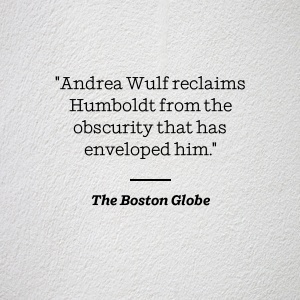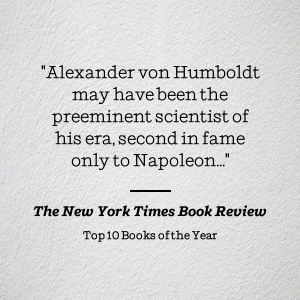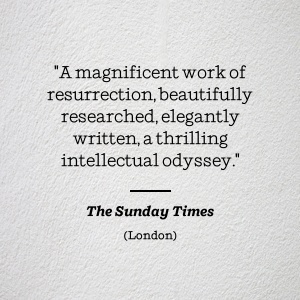

The Invention of Nature: Alexander von Humboldt's New World



C**J
Comments on Andrea Wulf's The Invention of Nature: Alexander von Humboldt's New World
Andrea Wulf’s biography of Alexander von Humboldt is a beautifully written work that restores our awareness of a life that paradoxically seems largely forgotten and yet is somehow familiar once this wonderful book is read. And to classify this work as a biography is not totally accurate in that it is a biography, a history of science, and a commentary on the interconnectivity of life from the viewpoint of both aesthetics and science. As well, it documents how von Humboldt influenced a number of other individuals who are now famous and better known to us.Wulf gives us great detail of the life of the fascinating man Alexander von Humboldt. She conveys an insight into how his early life molded him into a frenetic, driven scholar with a lifelong thirst for both knowledge and adventure. Perhaps more commonplace in the late 18th century than today, he became vitally interested in what would become later known as “scientific specialties” such as geology and botany as well as in aesthetics. His early self-concept led to his first and most monumental journey, along with the botanist Aime Bonpland, across the northern reaches of South America lasting 5 years and led to his view of nature as an interconnected force, a view that would shape the remainder of his long life. While his insights now resonate with us, this book makes clear that his comprehensive understanding of nature was totally new at the time and that the reason it is now familiar to us was his tremendous influence on others to follow.Wulf brings into clear view the strong friendship between the youthful von Humboldt and the poet Johann von Goethe and how each influenced the other. Von Humboldt developed an appreciation of the artistic side of life through Goethe while Goethe developed a fascination with science through von Humboldt that influenced the writing of his Foust. Later in life, both because of his own fame and through his brother (a foreign minister of Prussia), von Humboldt would meet many other famous people, with wonderful vignettes developed by Wulf. One such acquaintance was Simon Bolivar, whom he met in Rome well after his own travels in South America. Bolivar, born in Spanish Venezuela, would seem to have been inspired by von Humboldt’s poetic vision of South American landscapes and would return to his native land as liberator and later, sadly, as a dictator. Even during his long years of brutal warfare he was said to have maintained a strong interest in nature that had been inspired by von Humboldt.Von Humboldt’s view of colonial South America went far beyond the aesthetic appreciation of the landscapes and of the amazing scientific discoveries. He spoke out against the evils of colonialism, and slavery. He also noted how deforestation adversely affected the water table, animal populations, the atmosphere and much more. For this he became known as the founder of environmentalism.Von Humboldt’s scientific studies in Europe, South America and later the Asiatic part of Russia are well chronicled and led him to develop his view on how all of life is interconnected and part of one vital force. For instance, he invented the concept of atmospheric isotherms, showing how landmasses and oceans affect weather patterns, developing the field of meteorology. Late in life he wrote the five-volume work he called Cosmos. Based on his life’s work, the word “ecology” was invented.In the latter portion of this work, Wulf speaks of several of the more famous people heavily influenced by von Humboldt. While some might feel that this turns a wonderful biography into an unnecessarily long book, I feel this adds a most worthwhile dimension to her work. And just as von Humboldt himself saw the interconnections across all of nature, in similar fashion Wulf brings out the interconnections between the life and writings of von Humboldt and those individuals influenced by him who have so greatly influenced and even shaped our modern views of science and nature.I only became aware of The Invention of Nature through a review published in the Wall Street Journal that focused on the landscape painter Frederic Edwin Church and his painting called “In the Heart of the Andes”. Church had been motivated by von Humboldt to appreciate both the emotional impact on us from nature and its scientific aspects. He trekked through some of the regions of South America previously covered by von Humboldt and Bonpland and painted this landscape that was so detailed that botanists could discern the name of each plant and tree on the canvas. It was first displayed in 1859 just weeks before von Humboldt’s death. This review led me to read the Invention of Nature.Wulf goes on to describe the massive influence by von Humboldt on so many others. Charles Darwin had a copy of von Humboldt’s Personal Narrative with him during the voyage of the HMS Beagle and would later refer to von Humboldt in his own writings. Henry David Thoreau read Personal Narrative, Views of Nature and Cosmos and mentioned von Humboldt often in his journals. He narrowed his own view of nature to that of Walden Pond but tried to make it as comprehensive and interconnected as that of von Humboldt’s cosmos. George Perkins Marsh read all of the major writings of von Humboldt and was very motivated by him, becoming the prototypical conservationist and writer of Man and Nature. Ernst Haeckel was a German physician, artist and zoologist who was enthralled with von Humboldt. He studied microscopic marine life and then developed them into amazing works of art that led to the Art Nouveau movement and monism. And finally John Muir was deeply influenced by von Humboldt. He owned and heavily studied all of von Humboldt’s major books and extended von Humboldt’s thoughts on the spiritual connections seen within nature. Beyond the conservationism of Marsh, Muir advocated for protection of our environment and of course founded the Sierra Club and contributed to the development of our National Parks system. All of this is brought out in fascinating detail in the latter portions of Wulf’s book.In conclusion, The Invention of Nature is a description not only of a remarkable life but also of how we have come to think of environment, ecology, and nature itself. From it, I feel, we can be inspired to appreciate the nature that surrounds us from small to great, to widen our own views in a way that can bring a revitalization to ourselves and to cause us to advocate for the environment. I believe Alexander von Humboldt would be extremely proud of The Invention of Nature.By Jerry W. Jackson, Birmingham, Alabama
D**K
an unforgettable reading journey....
A very well-written book on arguably one of the most extraordinary and impactful persons the world has ever hosted, Alexander von Humboldt, would be a major challenge to anyone, given that it could easily be volumes of writing. But Andrea Wülf pulls out both highlights and specifics from her obviously extensive research and presents a highly readable experience that at times can have the reader on the proverbial edge of the seat. The book builds nicely on previous work by Aaron Sachs and especially Laura Dassow Walls and offers the most comprehensive view yet of someone i call the first "global ecologist," who was a courageous explorer but also a unique polymath and educator -- expert on plant geography, anthropology, physics, astronomy, history, meteorology, and a forerunner to the all-important field of climatology. Humboldt was all about what we need to be more of today -- realizing the vast chains of connection and mutual interdependence in the biosphere, learning from Nature and indigenous peoples, and practicing more humility in our daily ethics and ethos so as to be a better "fit" for the earth and its proven systems. The author does an excellent job also in explaining his unique duality of seeing Nature from careful science experimentation and observation yet always, he posited, interweaving the art, the imagination, the aesthetic. Indeed, so many of the great nature-paintings we know today, especially in North America as painted by Frederick Church and Thomas Cole and Martin Heade among others is due to Humboldt's influence. The book is an amazing excursion focused on a man who was held in the very highest esteem and admiration by the likes of Emerson, Thoreau, Poe, Goethe, Darwin, Muir, Bolivar, Haeckel, Church, and Thomas Jefferson. Wülf's work will help immensely too for those of us working to help rediscover Humboldt and his thinking -- especially needed today as we face the challenges of global anthropogenic-caused climate disruptions and extreme loss of biodiversity.
Trustpilot
1 week ago
1 week ago